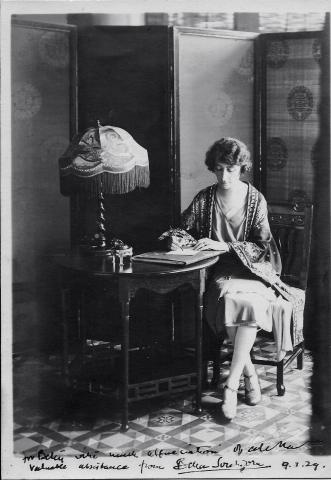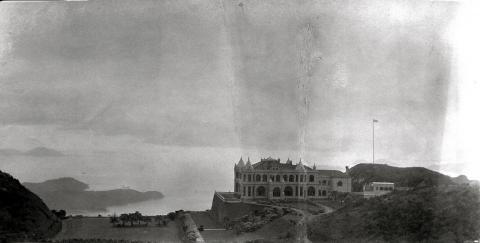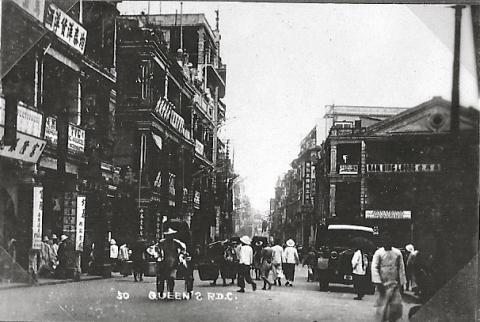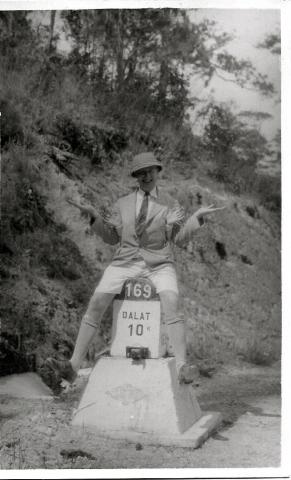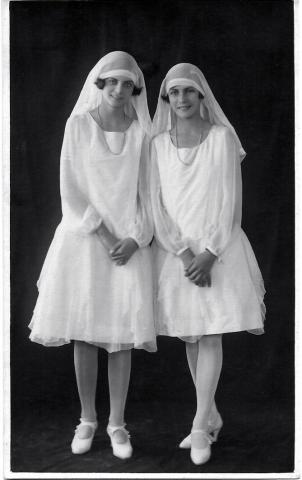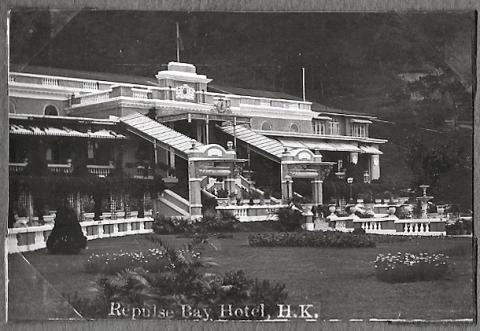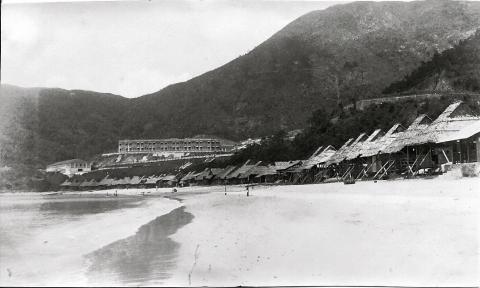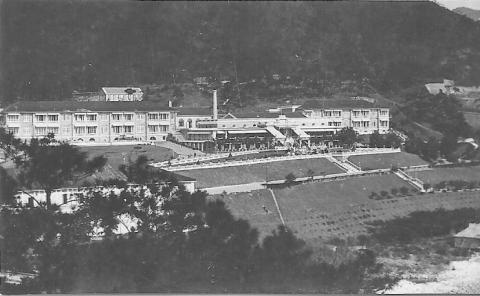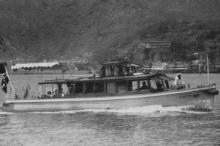Working, a Treaty Port Returned, the Dancing Season
Primary tabs
The Clementis went Home on leave in 1928, and the Colonial Secretary, the Hon. Mr. Wilfrid Thomas Southorn, became acting Governor, or to give him his correct title, Officer Administrating the Government. He was a large man, rather colourless after Sir Cecil, but his wife certainly made up for that. Mrs. Southorn was Bella Sidney Woolf. Her brother and sister-in-law were Leonard and Virginia Woolf.
Lady Southorn
With the advent of the Southorns, the whole atmosphere of Government House changed; formality was relaxed, and I became Betty instead of Miss Steel. Mrs. Southorn was a small dark-haired Jewess, full of charm and talent. I became her secretary as well as H.E.'s. It was fun working for such a friendly, informal person. She was writing a series of stories and sketches about Hong Konig, and I typed her manuscripts, as well as those she had written in Ceylon. The Hong Kong sketches became the little book called "Chips of China", published in Hong Kong by Kelly and Walsh. I still have the copy she gave me.
Sir Cecil Clementi left Hong Kong early in 1930, and Mr. Southorn became O.A.G. again until the arrival of the new Governor, Sir William Peel. The Peels seemed very ordinary after the Clementis and Southorns!
There were many Aides-de-Camp and Private Secretaries during my seven years, pleasant young men with whom I had not much contact.
In the hot summer months the Peels lived at Mountain Lodge, the Governor's residence on the Peak. It was a long journey for me every day, by tram to Garden Road, and by chair up the the Peak tram lower terminus; then in the Peak tram up past the roads named after past Governors; Kennedy Road, MacDonnell Road, Bowen Road, May Road, and their stations, the tram climbing like a fly on a wall. It made one giddy looking down on Victoria and the Harbour at such an angle. At the upper terminus near the Peak Hotel, one of the Governor's sedan chairs was waiting for me, the two chair coolies dressed in the Governor's uniform of red and white, to carry me up the winding road to Mountain Lodge. It was a breathtakingly beautiful ride, at every bend a new view of hills and blue seas and islands. The grounds of Mountain Lodge were open hillsides and smooth undulating lawns, and lining the long winding driveway all the way to the house were bushes of brilliant blue hydrangeas. Mountain Lodge was perched on a slope of the Peak looking southwards, and dramatically stretched out below it was the vast bluesea, studded with green islands large and small as far as the eye could see, with here and there junks in full sail. Surely no other girl has had the good fortune to be carried to work in a sedan chair on the shoulders of scarlet-clad Chinese coolies over the hills of a sub-tropical island!
The Mountain Lodge
I had tiffin every day with H.E. and his wife and the A.D.C. and P.S. The food though delicious was no better than that in our own house or anywhere else in Hong Kong, since all Chinese were naturally good cooks.
Audrey was a secretary with the commercial firm of Harry Wicking & Co., and later with Dodwell & Co.
Mamma was with Shewan Tomes & Co. from the year 1917 until her retirement in 1948. The taipans of the firm were Mr. Robert Shewan, Mr. William Adamson, and later Mr. Ian Shewan, Robert's son. Mr. Andrew Shields was the local manager. I can remember Mamma telling us about the provident fund, and the annual bonus. The Office was in Chater Road in one of the old "Colonial" buildings that were universal in Hong Kong in those days. At street level there were supporting columns, making a covered pavement, and the floors above had deep verandahs.
Queens Road Central
Since we were very young Audrey and I had been used to calling for Mamma at her office at 5 o'clock whenever we had to go shopping together, or meet friends. We would go up in the lift; and the office was a huge room with a long counter in front, behind which was Mamma's desk, and those of her companions. We had to walk past this counter, and Mr. Toppin used to tease us and say that every time we came, he could see more of us over the top of the counter. Miss Hayward was an elderly English spinster who lived at the Helena May Institute. The rest of Mamma's office companions were Portuguese, friendly, smiling people who always gave us a great welcome, Mrs. de Sales, Esther Carvalho, Mr. Botelho and the others. Bertha Carvalho married a German, and became the Baroness von Braun. In another part of the office were the Chinese compradore and his staff.
At Christmas Mamma and all the office girls exchanged presents, beautifully wrapped in Christmas paper and tied with ribbon and bows. Mamma would arrive home on Christmas Eve loaded with presents.
The large Portuguese community in the Colony were descendants of long ago settlers in Macao. Some of their surnames were Alvares, Alves, d'Assumpcao, d'Almada, Barretto, Botelho, Braga, Carvalho, Collaco, Cordeiro, Figuereido, Gomes, Gutierrez, Gonzales, Nolasco, Noronha, Pereira, Remedios, Ribeiro, Rodriguez, da Rocha, da Roza, Rosario, da Silva, de Sales, de Souza, Soares, Silva-Netto, Tavares and Xavier. In 1928 their Consul-General was the aristocratic Senhor Cerveira de Albuquerque, who with his plump Senhora, and pretty daughter Mariasinha, had come from Portugal.
Mamma and her friend Margaret Bradbury used to meet in the Gloucester Hotel lounge for tea after Mamma had finished work, at 5 o'clock. They would sit chatting away happily and then go off to the cinema, invariably arriving late for the film, but that did not seem to worry them. Other friends of Mamma were Claire Chaney (Harold's widow), ever vivacious and good company - she married again twice; Dreyer, a jolly Dane, and his lovely girl friend Alice Blake; and George and Doll Witchell. George was a great humorist and kept everyone laughing.
Mamma always looked young for her age. She had black, wavy hair, and brown eyes, and was extremely neat in her dress. She loved Audrey and me to dress well, and encouraged us to spend our money on clothes.
In the summer of 1930 I went to stay with the Jennings for the last time before the return of Wei Hai Wei to the Chinese later that year. My ship was a Butterfield and Swire steamer, the ss. "Kweichow" I think. I was on deck, leaning on the rail, gazing over the harbour and waiting for the ship to start, when a girl came to lean beside me. She told me that she was going to visit Peking. She was Kathleen Benington, a Government school teacher, and although she was the older by ten years, we became great friends. Our ship called at Swatow and Foochow, where we were entertained to tiffin in the bachelors' messes, word having gone ahead of our coming. I remember sailing up the Min River, and the pretty anchorage with its pagoda on the river bank. After leaving Wei Hai, the ship sailed on to Tientsin, and from there Kathleen went to Peking by train.
We sailed back to Hong Kong together in another B. & S. ship. On the first night I was attacked by bed bugs crawling out of the wall beside my bunk. Terrified I went to tell Kathleen and she came and slept in the spare bunk in my cabin to give me moral support! We told the Captain the next day and he professed not to believe us; so having armed ourselves with a glass jar supplied by the ship's cook, the next night we caught a specimen bug and gave it to the Captain in the morning. I was moved to another cabin after that.
The year before, I had met Derrick Milne-Day and Audrey met Brian Massey. They were both in the Hong Kong and Shanghai Bank. Derrick was 22, very fair and rather overweight, and known to one and all as Fatty - an unkind name. He was a cheerful, easygoing young man and unusually intelligent. The son of missionaries on the Malabar Coast, India, he had hoped to be a doctor, but finances would not allow the medical training. Brian was a couple of years older than Derrick, the son of a Shanghai family. He affected a cynical manner and a slight American accent.
Derrick Mile-Day
And so began the era of dancing parties in the winter and swimming parties in the summer. Our friends were Eve O'Hagan and Mike Turner (Hong Kong Bank), Betty Laing and Lolly Goldman (Gilman & Co), Edna Blackburn and Jake Selby (a Scottish doctor), Joe Coppin and G.A. Plummer, "Plums", Joe's brother Dudley, Margaret and Rosemary King, Eileen Lammert and Jim Henry (Reuter's), Eileen Bonnar, Joey Lack, Daphne and Vernon Stanion (her brother), Minna Whitham and her brother James, Jenny Whyte, "Uncle" Burch (Hong Kong Bank), Teddie West, Dick Beaumont, Shorty Stock and others.
Betty and Audrey Steel
We danced at the Hong Kong Hotel and Repulse Bay Hotel, and occasionally at the various bachelors' messes - the Hong Kong Bank (Wayfoong Mess); Jardine, Matheson and Co. (Ewo Mess); Butterfield and Swire. Balls were held, usually at the Peninsula Hotel, on St. George's and St. Andrew's Mights. The girls were given dance cards in which were listed by name the foxtrots and waltzes, and the men wrote their names in the blank spaces. St. Andrew's Ball was enjoyed for its bagpipes, Scottish reels, haggis and kilts. By special license Balls went on until 1 a.m. They all praised me for my dancing - and who could resist dancing in those grand hotel ballrooms with their smooth, shiny, brightly polished wooden floors,to the music of a sweet sounding orchestra. I could have danced for ever! Dance orchestras were composed of Filipinos from Manila, who showed by their smiles that they enjoyed playing as much as we did dancing. Their repertoire was all the latest American dance tunes. These were a few of them - Always; All alone; Whispering; Singing in the rain; What'll I do?; You were meant for me; My wonderful one; You're the cream in my coffee; The Saxophone Waltz; Bye bye Blackbird; You're driving me crazy; Me and my shadow; I can't give you anything but love; The Naughty Waltz; Three o'clock in the morning.
Repulse Bay Hotel
Every Saturday evening in the winter was "Saturday night in the Far East" as the bachelors called it, when we attended the dinner dance at the Hong Kong Hotel. The tables were placed along the edges of the dance floor, and we danced between each course of our dinner. Hotel dances ended at midnight, the last dance often being "Goodnight Sweetheart"! On Sunday morning, Mamma, Audrey and I would linger over breakfast, while we told her every detail about the party. She was always intensely interested in all our friends and wanted to know everything.
Although Kathleen was very much a part of our lives and I met her several times a week for perhaps tea or dinner, often with Mamma or Audrey as well, she never came to the dances. Her friends were older married people.
Jimmie and Tootie Begg were two of our married friends. They came from Shanghai where she had been Jimmie Cumming before she married. They knew the famous mercenary "Two-gun Cohen" (Maurice Cohen), Chiang Kai-shek's bodyguard, a tough looking man who occasionally visited the Colony from Canton. Eileen Lammert married Jim Henry - she was extremely pretty, and he was a funny man who liked to make us laugh. But poor Eileen became ill with tuberculosis and died.
In the winter on Saturday afternoons there were Rugby football matches in Happy Valley, and the girls would attend, to watch their bachelor friends rushing about getting covered in mud and sweat. But one dreadful day Brian's neck was broken while playing Rugger. He recovered, but never regained his good health.
On Sundays Derrick and Brian came to tiffin with us at Braemar Terrace, and our cook boy would produce his incomparable meals of fried fish, or whole fish cooked with ginger, chicken and rice, or Malay curry. There has never been such delicious fresh fish as that caught by the Chinese fishermen in the sea around Hong Kong, cooked to perfection by Chinese cooks.
In the summer Derrick, Brian, Mike and "Uncle" rented a matshed on Repulse Bay beach, and every Sunday a party of us spent the day there. The whole beach was lined with matsheds, delightfully cool shelters divided into a wide verandah in front where we had our sandwich picnics, and two changing rooms at the back, one for the girls and one for the men. We swam before tiffin, walked on the beach afterwards, meeting friends, and swam again later. There were rafts to swim to, and water taps on the beach to wash off the salt water. Repulse Bay was the most popular beach in the Colony, and crowded on a Sunday. When walking on the beach we wore pretty floral beach pyjamas or shorts, made by our Chinese tailor. Behind the matsheds, lining the beach road, flame of the forest trees were in full bloom.
Matsheds in Repulse Bay
Repulse Bay Hotel was set in the hillside above the beach. Steps led up to it through a garden of shrubs, flower beds and flower pots. It was a long low building, its wide verandah furnished with tables,and chairs and potted palms. Just inside was the ballroom, where tea dances and dinner dances were held. Electric fans hung from the ceilings, as they did in all hotels and offices, cooling the air in the hot summer. From the hotel verandah the view over Repulse Bay was quite lovely, especially so on nights when the stars shone and the fishing boats were out in the bay, each boat with a brilliant lamp for attracting fish.
Repulse Bay Hotel
